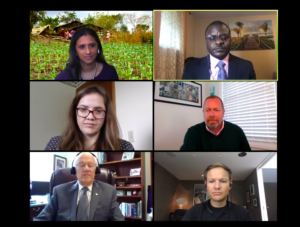2.5 billion smallholder farmers globally make daily decisions to protect their livelihoods and feed their communities. These farmers receive a staggering amount of information each day from government extension agents, private agribusinesses, and NGOs. With little coordination between these actors, farmers are given information and services that they didn’t demand and can’t use and are forced to make decisions about who they can trust. As climate change increasingly threatens production, and as supply chains are disrupted by crises like COVID-19, the divide between what is needed and what is offered continues to grow.
We have been working towards developing agri-tech solutions to boost the incomes of small-scale farmers. Building on more than ten years of experience with 2 million farmers across South Asia and Sub-Saharan Africa, we’re now leading the development of FarmStack, an agricultural data-sharing platform to enable organizations and individuals to transfer data through peer-to-peer connectors governed by usage policies that codify data sovereignty and control.
On August 20th, we were invited along with Hewlett Packard Enterprise & Microsoft to participate in a World Bank led webinar series on ‘Co-creating an industry standard for sharing agricultural data globally’. The discussions focused on farmers and the organizations that serve them don’t have an easy and secure way to exchange data which leads to fragmentation and silos; and
- We need to co-create a public infrastructure that automates the discovery, transfer, and transformation of agricultural data to address this challenge.
There will be two parts of the session; in the first part Rikin Gandhi, co-founder of Digital Green, will present the motivation & architecture of FarmStack with practical use cases. The second part will be a conversation with Lin Nease from Hewlett Packard Enterprises & Ranveer Chandra from Microsoft, on ways to co-create public infrastructure to automate the discovery, transfer, and transformation of agricultural data.
Rikin Gandhi from Digital Green shared the journey of why DG first decided to develop FarmStack, an agricultural data-sharing platform that enables data transfer through peer to peer connectors governed by usage policies that codify data sovereignty and control. He shared the vision for a decentralized architecture & how this effort fits alongside others (e.g., via CGIAR big data, GEMS, World Bank, HPE, GovLab, etc). With an example of a chili farmer in India, he shared how FarmStack can power multiple use cases (You can find his presentation here & a video link to an example use case here)
Rikin was then joined by Lin Nease from HPE, and Ranveer Chandra from Microsoft in a discussion on how each organization is trying to address challenges ranging from data discovery, privacy, security, and balancing incentives. Lin shared how they are supporting automated data discovery by developing data pipelines to enable easier exchange of data, data flow tracking, and data that is easier to find; & Ranveer shared Microsoft’s pioneering work with FarmBeats to make data more usable through visualizations & analytics, as well as more secure through Microsoft Azure’s Confidential Compute service for hardware-level encryption. They discussed the wide variation in availability and quality of data between the Global South and North.
Stewart Collis from the Bill & Melinda Gates Foundation highlighted the efforts of Gates Foundation & USAID to support the development of a supportive data ecosystem as a key enabling factor and encouraged all actors to consider how their actions and policies contribute to data governance norms and the emerging ecosystem. Laura Ralston from World Bank urged the group to look at data regulations & its implications, and find champions who can drive this effort forward.
Finally, Parmesh Shah from World Bank guided us through audience questions on implications of government policies (e.g., GDPR), the role of blockchain technology while continuing to highlight the importance of involving national and local governments in owning and sustaining such data-sharing platforms.
In case you missed it, you can watch the recording right here! We look forward to hearing your ideas and learning from your experience at contact@digitalgreen.org

 including youth. Yesterday, I moderated a panel, on the sidelines of the World Food Prize, focused on
including youth. Yesterday, I moderated a panel, on the sidelines of the World Food Prize, focused on